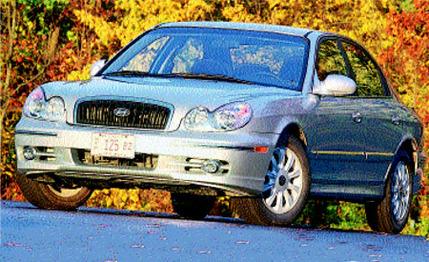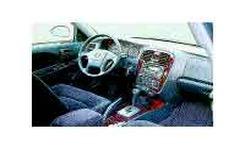
 Short Take Road Test
Short Take Road Test
If you've eyeballed some of the Hyundai car reviews coming recently from the word processors of our colleagues, you'd figure Hyundai for the scrappy, pure-hearted kid out of the automotive rewrite of a Horatio Alger story. You'd believe the Korean company has arrived at parity with the Japanese.
But Hyundai cars still take a brutal plunge when it comes time to enter the used-car market. Even after quantum improvements in sophistication and refinement in its current model lineup, no Hyundai could be said to lead its class by either measure segment for segment. But no Hyundai is nearly as expensive as class leaders. With the prices Hyundai charges, it doesn't need parity with Toyota and Honda to be successful. It needs credibility among buyers as a good long-term value.
And the company has been earning that credibility over the past few years. A long warranty (five-year/60,000-mile bumper to bumper and 10-year/100,000-mile limited powertrain) was the first building block. To a segment of the buying public, that's been enough to quell fears about quality.
The warranty helps to get folks into the dealership for a look, but the cars must be compelling enough once customers take a closer look. Since it was completely redesigned as a 1999 model, the Sonata has been winning more of these customers every year.
For 2002, there isn't a quantum leap as there was three years ago, but the Sonata is subtly better than before. That Hyundai is in a position to make minor but continual improvements to its cars is an indication of how far they have come in the past ten years.

 When we tested a Sonata in '99, we hailed its transformation into a genuine contender but noted that the 2.5-liter V-6 could use about 25 more horses. We didn't get that. But Hyundai did stroke the DOHC V-6 to 2.7 liters. It now produces 181 horsepower--11 more than in '99. The increased power--along with 11 more pound-feet of torque--cuts more than half a second off our 2.5-liter Sonata's best 0-to-60-mph time (from 9.5 to 8.8 seconds). That's about a second slower than the 3.0-liter Honda Accord and a little quicker than a Chrysler Sebring's 2.7-liter V-6. So if the Hyundai V-6 isn't the smoothest of the lot, it does at least provide competitive performance. But despite the increase in torque, the midrange feels weak-kneed and there are some flat spots in the torque curve.
When we tested a Sonata in '99, we hailed its transformation into a genuine contender but noted that the 2.5-liter V-6 could use about 25 more horses. We didn't get that. But Hyundai did stroke the DOHC V-6 to 2.7 liters. It now produces 181 horsepower--11 more than in '99. The increased power--along with 11 more pound-feet of torque--cuts more than half a second off our 2.5-liter Sonata's best 0-to-60-mph time (from 9.5 to 8.8 seconds). That's about a second slower than the 3.0-liter Honda Accord and a little quicker than a Chrysler Sebring's 2.7-liter V-6. So if the Hyundai V-6 isn't the smoothest of the lot, it does at least provide competitive performance. But despite the increase in torque, the midrange feels weak-kneed and there are some flat spots in the torque curve.
The Sonata has too little flatness in turns. At a steady cruise on a gently curving on-ramp, the Sonata heals over, shifting what seems like all its weight to the outside tires--a consequence of Hyundai's successful quest for a soft ride.